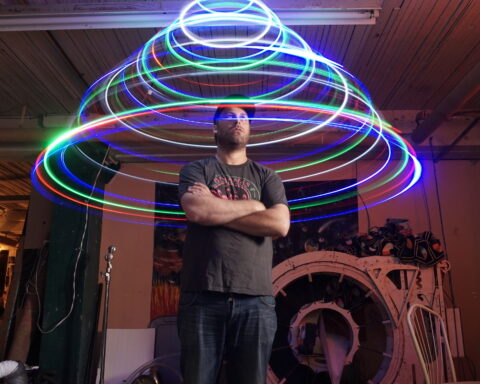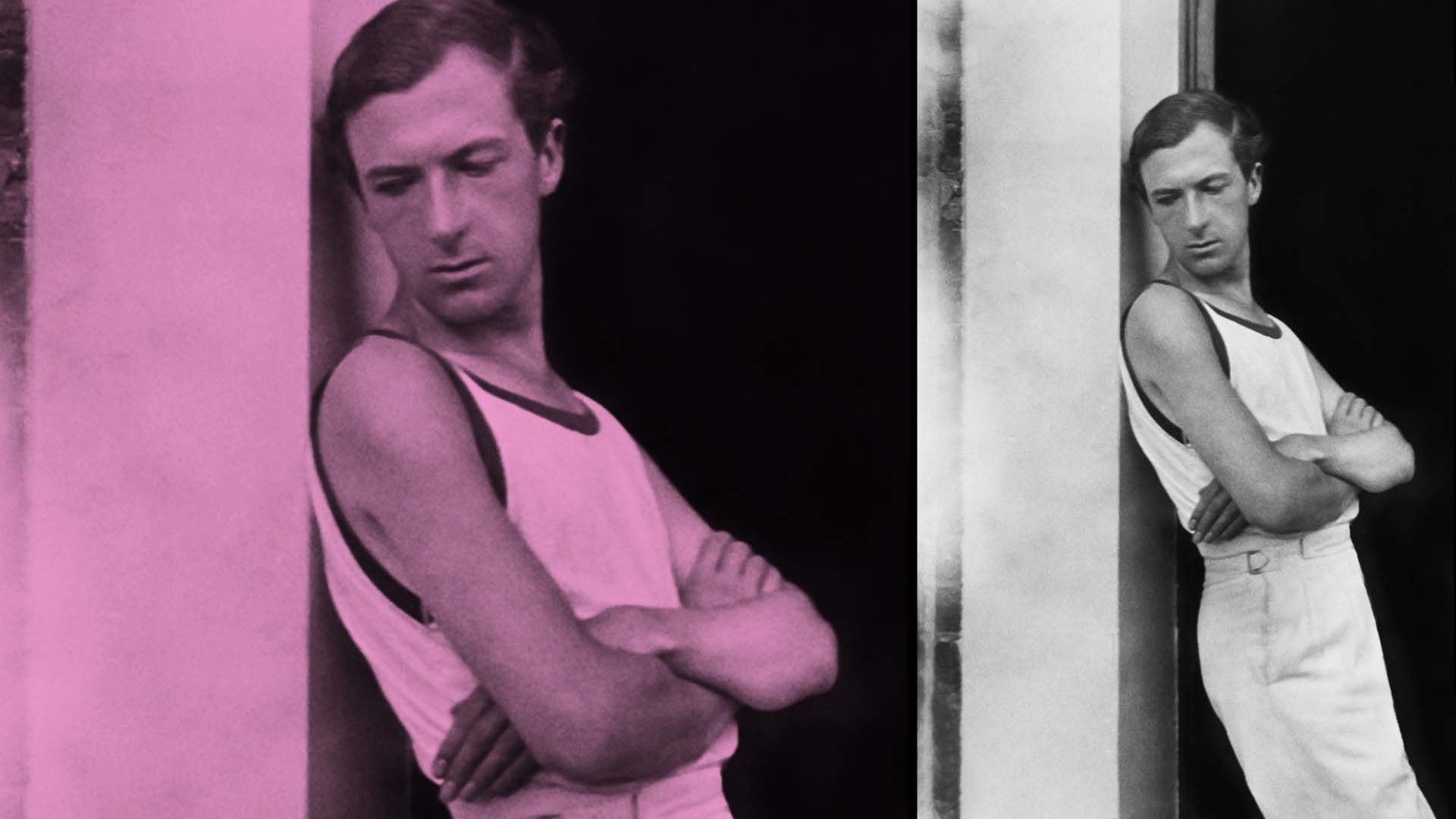The most unsettling and painful scene in Resurrecting Hassan takes place at a Montreal metro station. There, the Harting family (Denis, Peggy and their daughter Lauviah, who have all been blind since birth) sing their busker act. On this day, their routine is marred by an escalating fight between mom and dad. They bicker about their relationship, which is clearly fraying. Passersby can be seen, pausing, and looking on uncomfortably. Their bruising fight carries on for what feels like an eternity, and it makes one thing very clear: Denis and Peggy don’t have any problem letting their personal lives go very public.
And that, in a sense, is part of what gives filmmaker Carlo Guillermo Proto a certain license with his feature-length film, which chronicles the family’s ongoing grief about the loss of a son, who drowned over a decade ago. While a Concordia film student, Proto used to see the family perform their act at a metro station, and says he was mesmerized watching them and wondering what their story was. He eventually summoned up the courage to talk to them and what he heard convinced him a documentary was in order.
Watching Resurrecting Hassan should set off every alarm bell imaginable, as it crosses so many lines and traces so many familiar patterns of documentary filmmaking. When attending Concordia’s film school myself, we used to joke that every production student got the obligatory assignment of “Go to a Metro Station and Find a Homeless Person and/or Busker to Make a Documentary About.” The joke stems from what critics of documentary filmmaking call “poverty porn”—-films about poor people who are shot through the perspective of middle-class or upper-middle-class outsiders. That the Hartings are also disabled will undoubtedly also strike some as exploitative, of an outsider peering in. (As well as their blindness, Denis and Lauviah are on the autism spectrum.) There is an uncomfortable intimacy in the doc, as we watch people sleeping, showering, having intimate phone calls with lovers and attending counselling sessions.
Charges and questions of exploitation are now the standard tests for virtually all documentary films since even the most well-meaning of non-fiction filmmakers occasionally caused pain or havoc in the lives of their subjects. But Proto manages to sidestep these questions due to the aforementioned openness of the family and one key plot twist: the Hartings are now engaging with people who make ludicrous pseudo-scientific claims that they can resurrect the dead. The Hartings attend various meetings where they discuss the idea that their beloved long lost son can actually come back to life. Denis even cites Gregori Petrovich Grabovoy, the Russian mathematician who has claimed he can bring the dead back to life (as well as claiming he has cured patients of AIDS and cancer). Thus our concerns as viewers immediately shift from what the filmmaker might be doing to how the Hartings are being victimized by junk scientific philosophy, a brand so cruel it tells them it can somehow regenerate a lost loved one. The film includes a scene of one attempted seance or resurrection, in which participants claim to feel Hassan’s presence — almost as convincing as a round with a Ouija Board. The extent of their grief is so extreme that they have bought into this blatant scam. It makes their story that much more excruciating.
Proto assumes an observational style of documentary filmmaking, rarely engaging with his subjects, and offering no narration. This works remarkably well, but we still feel the presence of the director through a number of shots. There are two point-of-view shots used, in which we see what’s happening from the perspective of one of the Hartings — shots which are obviously innately absurd, given that we are seeing a POV shot from the eyes of someone who can’t actually see.
Charges of exploitation against doc filmmakers probably had their most heated moment in 1975, when the Maysles Brothers released what would become their most controversial film, Grey Gardens. They captured a mother and daughter, Big Edie and Little Edie, as they bickered their way through the feature-length film in a dilapidated mansion, called Grey Gardens. It was captivating as much for what it did show as what it didn’t; the film was intensely mysterious. How did these two stunning women, once part of the east-coast aristocratic class and related to Jacqueline Onassis (herself regarded as an iconic enigma), fall so severely into financial and social ruin?
Grey Gardens ignited huge debates when it arrived, and understandably so. The Edies were captured in all of their intimate glory, sometimes seemingly defiantly optimistic and non-conformist, other times downright delusional. They fed the burgeoning raccoon infestation in the attic with Wonder Bread and cat food. The New York Times critic complained that the film revealed too much sagging flesh, arguing that “the moviegoer will still feel like an exploiter. To watch Grey Gardens is to take part in a kind of carnival of attention with two willing but vulnerable people who had established themselves, for better or worse, in the habit of not being looked at.” Little Edie wrote a letter to the Times editor to insist she and her mother were fine with the Maysles’ film; tellingly, it was never published.
Since 1975, the experience of watching a documentary has evolved considerably. In particular, most audience members have endured huge amounts of Reality TV, a vaguely-defined genre that includes leering seasons of rich, clueless celebrities to what are essentially game shows. Sadly, documentary filmmaking and Reality TV are often conflated. But their differences are considerable: cinema verite and Direct Cinema came as a result of lightweight, less expensive equipment like 16mm cameras, meaning filmmakers could move more easily and on the cheap, allowing greater access and the ability to explore issues mainstream media might be ignoring. Reality TV was about networks maximizing profits but scaling back production costs (a fraction of the writers needed and no expensive professional actors to hire). If documentary filmmaking, in particular the kind that expanded considerably in the ’60s, was about making the world a better place through consciousness-raising, Reality TV has been mired in cynicism. Its very name reeks of contradiction and dishonesty: as anyone who has ever worked on a Reality TV show will tell you, most things about the shows are faked or staged. The shows invite us into a lurid spectacle while daring us to figure out when we’re being lied to, which is probably most of the time. The drama unfolding in a Reality TV show are about as connected to reality as the statements of the President of the United States.
It is precisely this context that makes screening _Resurrecting Hassan_ a kind of cathartic release. Porto has created a multi-faceted profile of several people who are flawed and fragile, yet admirably resilient. The filmmaker is trading on documentary tradition while also taking into account the Reality TV phenomenon, making a film that manages to transcend charges of exploitation, despite charging through a veritable minefield of ethical issues and documentary tropes.
{image_6}
Documentary filmmakers have long conceded to philosophers and film theorists who argued there can be no essential Truth. But as filmmaker Lynne Fernie (Forbidden Love) has suggested, if filmmakers cannot reach an essential Truth, they should at least aim for something truthful. Resurrecting Hassan is a remarkably sad film; by final credits, Denis has conceded that a resurrection of his late son has never been successful, while Denis and Peggy’s marriage is clearly all but over. Proto punctuates his film with fleeting home-movie images of the young parents tending to both their children, and we see Hassan in diapers. Their memory if him, the images suggest, will never really fade.
But as sad as the narrative is, the form of Resurrecting Hassan is somehow defiantly uplifting, as it is testimony to the ongoing power of the form of documentary filmmaking, even in a world soaked in the pulp that is Reality TV. If we can’t have a singular, essential Truth, Resurrecting Hassan tells us, we can have something as poignant as the truthful.
Resurrecting Hassan is nominated for a Canadian Screen Award.
Read more about Resurrecting Hassan in ‘Message in the Music’.
Resurrecting Hassan (2016) – Trailer from The Handshake Productions on Vimeo.












